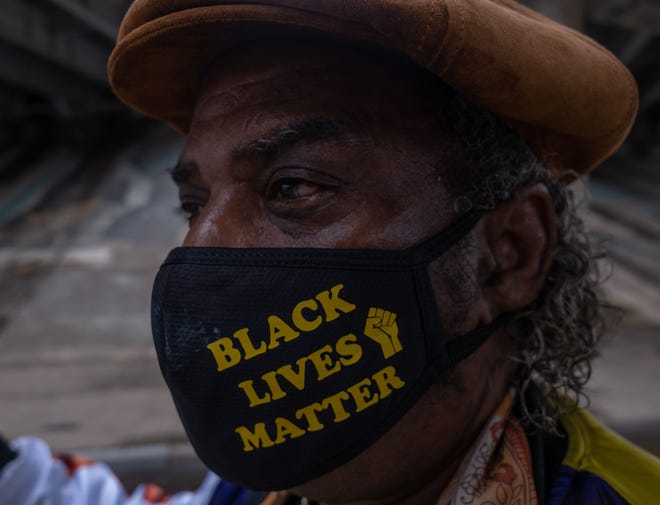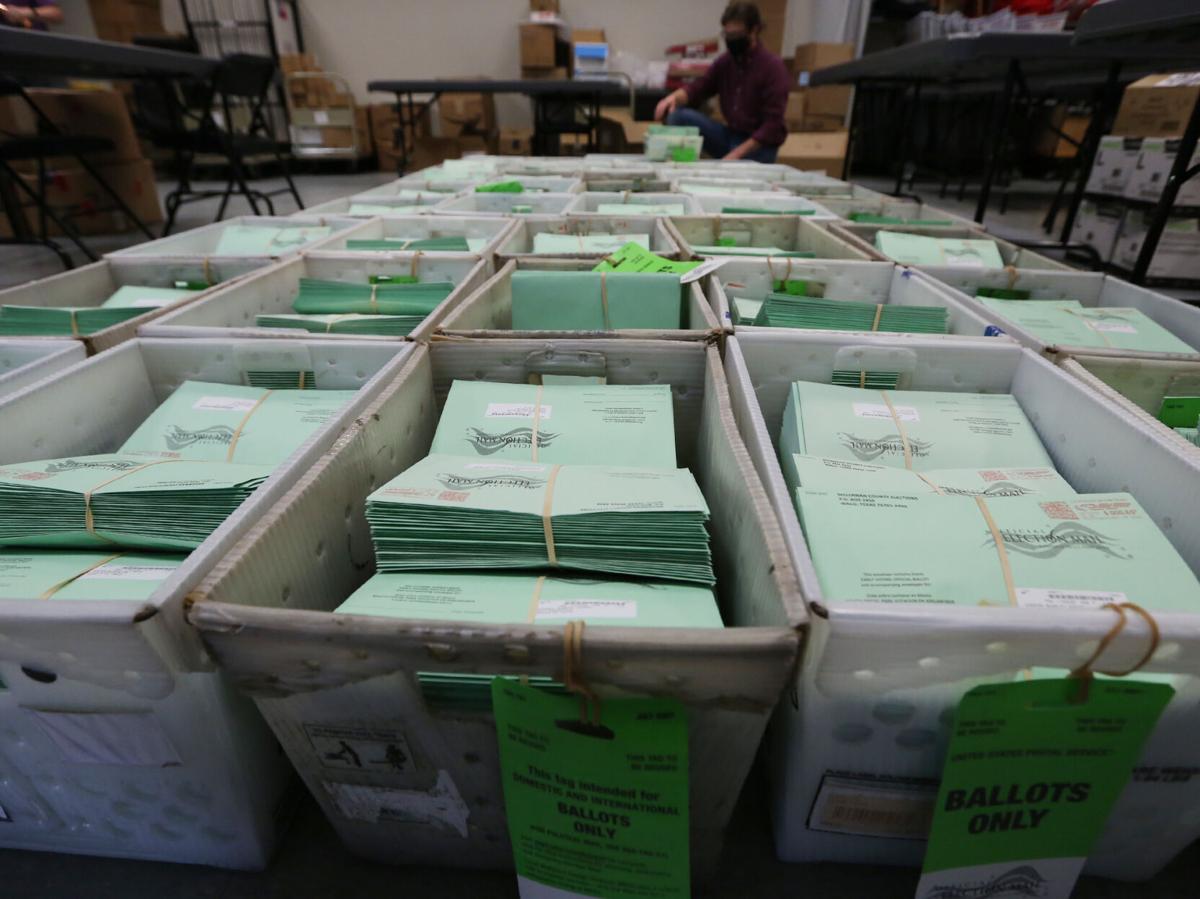Political party affiliation is not listed on city-level ballots, but it could have been, had a bill requiring it survived the most recent session of the North Dakota Legislature. That bill — HB 1375 — would have required party designations on a slew of local positions, from city council to park board to school board. It died on the House floor in Bismarck after a wave of responses from officials in more than two dozen communities, many of whom were worried about partisan politics dividing their local governments or about their party’s reputation speaking louder than their own campaign.
Sande is no idle example. A member of the council since 2010 and elected by his peers as its ranking member, he also was a delegate to the state GOP convention in Grand Forks in 2018. He makes no secret of his politics.
“I don’t need a letter after my name for people to understand my affiliation,” he said, describing himself as fiscally cautious — backing a recent sales tax hike as a matter of financial necessity — and one that takes a pragmatic approach to paving streets and clearing out snow. “If they were paying attention to how I vote, they would be able to recognize which way I lean.”
Despite Sande’s ambivalence, proponents said it was a matter of transparency. It raises deep questions about the mechanics of local government.
RELATED:
-
Roseau feels the strain as Minnesota-Canada border hassles take a toll
-
Metropolitan Planning Organization leader says group is transparent
What would partisan politics do to a city council or school board — herald a descent into tribalism? Offer local voters a convenient shorthand? Saddle local politicians with the political baggage of a national party?
State Rep. Scott Louser, a Republican from Minot and a co-sponsor of the legislation, took to the House floor in February to defend the bill. He ticked off a range of complaints: politicians afraid to lose elections if they disclose their party, or local-level elected officials worried they would have to declare for a different party than they’d prefer, just to gain or keep their office.
“We heard there may be too many people in one party on a board or a commission or a council. How are you ever going to know if they don’t declare the party?” Louser asked his colleagues. “We hear we don’t want local politics to be political — now, I think what’s being meant is we don’t want it to be partisan. But what’s being said is that we don’t want it to be political. It is political.”
The bill was defeated in a 37-53 vote, and there were a few notable trends among those 37 supporters. They were entirely Republican, and by the Herald’s analysis, more than 70 percent were from North Dakota’s 10 largest cities — where many of the most powerful local offices affected by the bill are located.
“I’m not saying it’s right or wrong,” Sande said. “I’m just saying that if you’re a political strategist, and your goal is to move a certain mindset across the state, and you know that you have a heavy majority … and if you’re trying to recruit people to run for office at the state level or the federal level, that would be a great way to get people’s names out at the local level and start molding them towards future position.”
And it’s also true that the state has been a hard place to be anything but a Republican in recent years. Democrats are deep in the minority in Bismarck, and saddling local council candidates with a “D” after their name might result in big changes in local politics.
“The thinking is, if you force somebody to take the cloak off … then they’ll be revealed for who they are and no one will vote for them,” said Bo Wood, a professor of political science and public administration at UND.
State Reps. Mark Owens and Jake Blum and state Sen. Scott Meyer, all Grand Forks Republicans, co-sponsored the legislation with lawmakers from around the state. Meyer, responding to claims the bill is “strategic,” said that even if it did favor a party, it would only do so for as long as that party curried favor with local voters.
But an essential question to the debate is whether or not partisan politics is necessary for local decision-making — or if the partisan debates voters are used to seeing in national news even work on a small scale in Grand Forks’ comparatively tiny local politics.
“A core tenet of public administration is this idea that there’s no Republican or Democratic way to pave a street or collect the garbage,” said Wood. “But it’s not wrong to say that, certainly city councils, especially these days, they have a policy agenda.”
And it’s also true that Grand Forks has handled issues in recent years that aren’t, strictly speaking, collecting the garbage. The City Council changed Columbus Day to Indigenous People’s Day last month. It passed an “inclusion resolution” in late 2017 welcoming people of wide-ranging identities to the city. Both were more than mere acts to balance the municipal checkbook; they were statements about local ideas and values.
Wood also points out the 2016 mayoral race, pitting Mayor Mike Brown — who was deeply supportive of city arts investment and local “vibrancy” — against then-Council member Terry Bjerke, who was rankled by what he saw as wasteful public spending. The election might not have elected a partisan, but it chose an ideological direction for the city all the same.
Sande acknowledged that, for years, there has been a philosophical core at the center of city politics — though he said there’s more to the mayor than meets the eye.
“(Brown) is relatively fiscally conservative, but the mayor also wants Grand Forks to be a great community,” Sande said. “So the mayor makes his spending decisions based on what he thinks will be best for our community. So there are a lot of people who think the mayor leans left. But the mayor also carries a gun.”
Sande said he thinks constituents would be “surprised” to learn about the mayor’s personal politics. And if the mayor was beholden to a political party, he said, the city would be no worse off — but it would be “dramatically different.”
“Just different,” Sande said. “I don’t think we would be investing in the vibrancy initiatives.”
Brown also previously endorsed Democrat Heidi Heitkamp in her re-election bid for U.S. Senate.
“When we see the dysfunction at the national level … we get people who — they don’t put the country first, they put themselves first or the party first, and I think that’s been detrimental to the effectiveness of our national government,” Brown said, rebuffing the bill. “Them fighting doesn’t solve issues on our local level.”
But what would be Brown’s declared affiliation if it was required on the ballot?
When asked, he would not tip his hand on how he would run if HB 1375 had passed, saying he does not know what partisan identifier he would choose. He joked that, as a leader of a city that consistently works with legislators from both parties, he “would have been in all parties.”
When asked by the Herald over the last week, council members had varying answers to that same question. Council President Sande and member Danny Weigel would run as Republicans, they said. Fellow members Ken Vein, Katie Dachtler and Sandi Marshall would run as independents. City Council member Bret Weber, did not respond to text messages asking what he would do.
“One of the things that I really like about local politics is that it is nonpartisan,” Weber said in an earlier conversation last week. “I think that’s part of why local politics are functional, and national politics are so dysfunctional. In fact, I’m not sure why state legislators need to have a letter after their name.”
City Council member Jeannie Mock is one who knows all about the tension between partisan politics and an ostensibly non-partisan job. She’s the wife of state Rep. Corey Mock, D-Grand Forks, the erstwhile House minority leader. She said that if the bill had passed and she was required to declare political affiliation, she wouldn’t run for re-election.
“No person is without ideology, and no person is perfectly without political partisanship of some sort,” she said. “(But) when I ran, it was very important that it was a non-partisan race because I didn’t want to identify with one or the other.”
And Mock argues that ideas inherent in partisanship — like the ones heard on national cable news — don’t really map onto local issues. It’s strange to consider the relevance of party affiliation to local items like paving the streets or local planning and zoning.
That tension, when weighed in the context of truly hot-button issues, can be dramatic.
“I don’t know that you need to have an official position on abortion in order to be a city councilperson,” Wood said.



